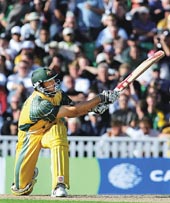 |
| Indian cricket fans after the victory in Rawalpindi on Friday. (Reuters) |
Atari (Indo-Pak border), April 16: Prakash Singh Sandhu, 58, who ekes out a living farming four-and-a-half acres of the thin strip of fenced land that marks the border with Pakistan, is a happy man.
For him at least, India is smiling, if not shining.
Sandhu stands with a radio spattering out commentary of the Rawalpindi Test between piles of freshly-cut golden wheat stalks under the watchful eyes of a BSF soldier standing guard at the metal gate opening onto the border farms fenced by two rows of barbed wire.
“Ever since the (Atal Bihari) Vajpayee government started the peace initiative, times have turned better for us. We can farm longer hours, there is no tension, no firing by the Pakistan Rangers,” he says.
The crop is not as bountiful as Sandhu expected. “Earlier than expected heat has meant smaller grain and about 15 per cent less yield. But this is perhaps the first year since Kargil when I will be able to reap and carry away my whole crop in time,” he says.
Tension with Pakistan in the past has meant shorter and riskier farming hours leading to huge acres of grain withering under a relentless sun. “Three years ago when India decided to post troops along the border, we were ordered off our fields and this entire land along the border was allowed to run wild as military sappers planted mines in this very land. It lost us three crops,” the farmer says.
Farmers in neighbouring Rodala and Pukka Pind as well as in countless villages along the 167-km-long border in Punjab faced the same problem. “We sat on our haunches waiting. I don’t know how to play cricket but that is the time I started watching television like an addict and took to cricket,” he says.
Many villagers were hit by stray bullets during the heavy gunfire that began soon after Parliament was attacked in December 2001. “After tension simmered down, I was allowed back on my farm. But I was still scared that the army would have left behind mines by mistake. For the first few weeks, I did not permit my younger son to join me here,” says Sandhu as he loads his grain on to a trailer that will take the produce to a temporary mandi at nearby Khasa.
The farmer says those were difficult times and the government paid compensation for the lost crop at Rs 11,000 an acre only after many representations.
Hopes of peace with Pakistan triggered by the recent cricket diplomacy have transformed Sandhu’s sleepy village, better known as the last railway stop on the route to Pakistan, in more ways than just longer cropping hours.
“Land prices have gone up. Not on the border itself, but near the border all along the highway to Amritsar. It now costs as much as Rs 10 lakh a killa (roughly an acre), nearly double what it was five years ago,” says Hardev Singh, 60, Sandhu’s neighbour. Villagers are hoping peace will also mean more trade through Atari and jobs for their sons.
Singh points out that businessmen have been looking for farmland to set up engineering firms for possible assembly meant for the Pakistani market.
The Wagah border checkpost, half-a-kilometre from Atari village, is awash with banners that read: Indo-Pak heart conference. Cardiologists from across the border are coming over to hold talks with their Indian counterparts in Amritsar.
The border villagers have seen two wars and are sceptical about lasting peace. “How long do you think this bonhomie will go on? We farmers want peace. But if we start making peace, what will happen to all these borders and fences and these huge numbers of soldiers on both sides?” asks Sandhu.











